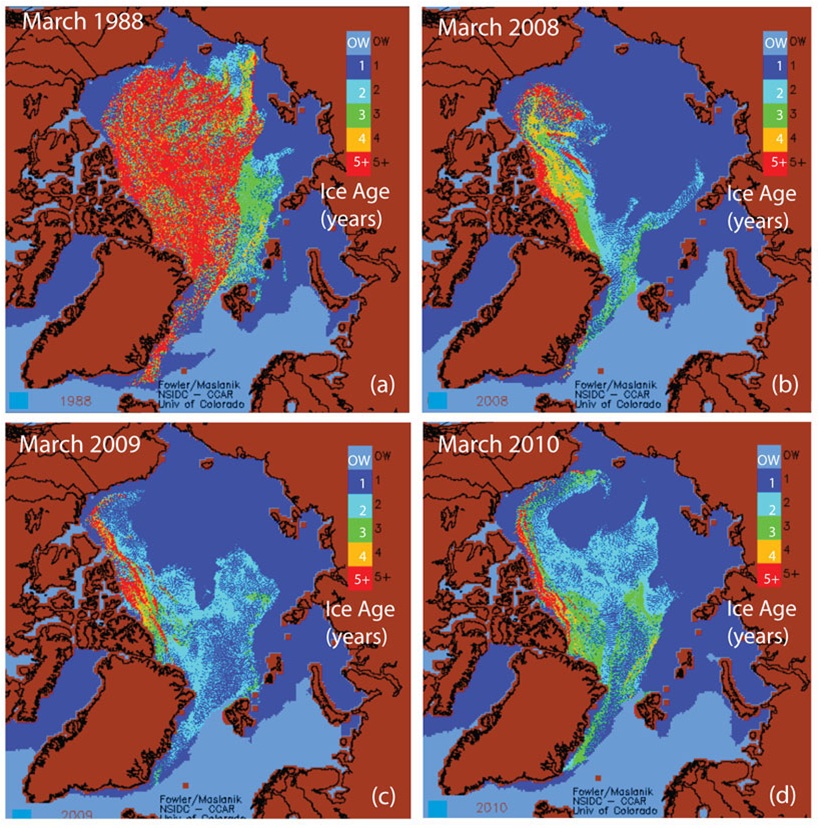2010 Dec – Climate and economics are tied in more ways than one might imagine. The balance of resource economy and socio-economic capacities along with long-term needs are still not well addressed from a state policy level. This months feature article generally addresses some cogent points about economics. The Leading Edge: Balancing Economies; Arctic Ice volume 78% below; Security Council Germany; The Case for the Keeling Curve.
Arctic Ice Volume Loss – 2010
Balancing Economies
By John P. Reisman at 23 October, 2010, 6:30 pm
Accounting is essential for business and governance, or even a family, to understand what ones capacities are in order to make better decisions. Balancing the budget gives us precision in understanding where we stand with deficits and surpluses.
When considering our economies, we need to understand these economic capacities and deficits in order to know where we are, and what is possible in the near future, or long term. This allows us to determine how healthy our economies are, and their respective capacities. We need to know if we are overdrawing on economic capacity, or if we will be able to afford accumulated debt in consideration of future economic capacity to sustain operations. This of course is risk/ratio analysis and general accounting based on relevant factors. And we need to balance the books and make sure we can stay in business.
So what are we really talking about?
The global economy of course. But it’s not what you might think. It’s not about the money. It’s about the resources we trade in markets to build our buildings, provide our services, and manage the food and water supply for our communities. Money is only a meta economy and understanding the difference is critical if we truly wish to have a healthy economy.
The economy is a combination of our ‘resources, and capacity‘. It includes minerals, chemicals, food, water, and all the systems that support or supply us, and our needs. It also includes services, and that includes knowledge and understanding. Intellect, expertise and understanding is a resource that can be bought and sold on a supply/demand basis. So there are ‘many’ components to our global economy that are not monetary. Money, is merely our means of exchange.
In effect, our economy includes ‘systems and materials’ that keep ‘us’ alive and functioning.
What are these systems?
First there is our immediate environment: land, ocean, atmosphere and solar energy to power it all. Without the sun, we would not have energy to burn anyway. Besides, fossil fuels are really just stored solar energy.
Then you have our elements, which we use in manufacturing processes. Of course land and water to produce food. The atmosphere is an exchange system to transport energy and water to different regions supporting biological and agricultural systems. Then you have human productivity. This is our interaction with all these systems to take the benefits of the resources and turn them into products we make, sell and use.
So, what would happen if we overtaxed our resource economy? Let’s say we overtaxed an economy to the point of it’s demise. Well, that just means we don’t have that economy anymore (unless other economies that were dependent on that economy also failed due to the loss).
So, what does over-taxation really mean?
It’s simple. Any subsystem on earth upon which we are reliant which is overtaxed will disturb the economic health of the system. That includes the economy of the ocean, the atmosphere and the land. A healthy economy is an economy we can rely on in the long term.
Source: Balancing Economies
Relevant News and Event Highlights
Arctic Ice volume is now estimated to be 78% below
“September ice volume was the lowest recorded in 2010 at 78 percent below its 1979 maximum and 70 percent below the mean for the 1979-2009 period.”
Admiral Titley – Chief Oceanographer, United States Navy,
Source: https://www.arctic.noaa.gov/reportcard/seaice.html
Security Council must tackle climate change: Germany
BERLIN — Germany, which will join the UN Security Council in January, believes the body should start dealing with climate change as a potential global threat, its UN ambassador said on Monday.
Peter Wittig told an audience at a think tank in Berlin that Germany shared the view of the more than 40 island states represented at the United Nations that global warming was an urgent security issue.
“We are of the opinion that it would be worth the effort to consider strategically — in the Security Council as well — which effects climate change could have on the security situation in the broadest sense including defence assistance, resource assistance, the disappearance of entire island states, the rising of sea levels,” he said.
Source: AFP
Scientific Integrity: Fueling Innovation, Building Public Trust
Posted by on December 17, 2010 at 02:17 PM EST
On March 9, 2009, President Obama issued a Presidential Memorandum on Scientific Integrity emphasizing the importance of science in guiding Administration decisions and the importance of ensuring that the public trusts the science behind those decisions. In it he highlighted six principles of scientific integrity that would be at the core of this Administration’s approach to policy making. And he asked me, in collaboration with other Federal officials, to craft recommendations for ensuring scientific integrity throughout the executive branch.
Today, in response to the President’s request, I am issuing a Memorandum to the Heads of Departments and Agencies that provides further guidance to Executive Branch leaders as they implement Administration policies on scientific integrity. The new memorandum describes the minimum standards expected as departments and agencies craft scientific integrity rules appropriate for their particular missions and cultures, including a clear prohibition on political interference in scientific processes and expanded assurances of transparency. It requires that department and agency heads report to me on their progress toward completing those rules within 120 days.
Source: White House
The Case for the Keeling Curve
By John P. Reisman – Dec. 23, 2010 (Based on the original article by JUSTIN GILLIS)

Ralph Keeling – Photo by Sandy Huffaker for New York Times
At this critical time in understanding and verifying the science of human-caused climate change, redundancy of lines of evidence is a good thing to have. Some still question the validity of government measurements about carbon dioxide levels. How can anyone know the data is good?
Two independent lines of evidence now exist on the measurement of carbon dioxide. The original Keeling Curve work initiated at the Mona Loa Observatory, and the US governments program at ESRL (Earth System Research Laboratory). Two independent lines of evidence. Redundancy, verification. This makes for strong science in an uncertain public.
Budgets are tight, but the cost of not making the strongest possible case based on solid verifiable evidence has never been stronger. Continuing the Mona Loa record is the best way to give confidence to the public and continue the baseline of evidence that clearly shows that CO2 is rising and that the rise matches the increase expected by industrial output and changes in the carbon sink.
Source Reference Article: New York Times

